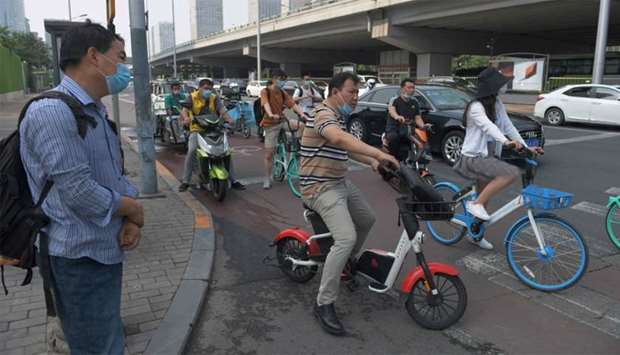The Chinese capital Beijing shut dozens of metro stations and bus routes yesterday in its campaign to stop the spread of Covidd-19 and avoid the fate of Shanghai where millions of residents have been under strict lockdown for more than a month.
China’s uncompromising battle against the coronavirus, which is believed to have emerged in Wuhan city in late 2019, is undermining its growth and hurting the international companies invested there, according to the latest forecasts and data.
The central city of Zhengzhou, home to 12.6mn people and a factory of Apple’s iPhone manufacturer Foxconn, announced work-from-home and other Covid curbs for the coming week late on Tuesday, joining dozens of big cities under some form of lockdown.
The capital shut more than 60 subway stations, about 15% of the network, and 158 bus routes, service providers said.
Most of the suspended stations and routes are in the Chaoyang district, the epicentre of Beijing’s outbreak.
With dozens of new cases a day, Beijing is trying to avoid a full lockdown, as Shanghai also did initially, instead hoping that mass testing will find and isolate the virus before it spreads.
The city of 22mn people has closed schools, restaurants, gyms and entertainment venues, as well as some businesses and residential buildings in high-risk areas.
In what will be a worrying sign for Beijing residents, workers in protective gear were seen setting up a two-metre high blue metal wall around a residential complex, with a sign at the gate reading “Entry only. No exit.”
Twelve out of 16 Beijing districts conducted the second of three rounds of tests this week, having done three screenings last week.
In Shanghai, there’s no end in sight for the lockdown.
After more than a month, most people in mainland China’s biggest city are still not allowed to leave their housing compounds.
Some residents have benefited from a tentative easing of precautions since Sunday, with usually just one member of a household allowed out for a quick stroll and grocery shopping.
The latest data showed Shanghai found 63 new cases outside areas under the strictest curbs, suggesting it has a way to go before reaching the goal of no cases for several days for curbs to ease significantly.
The isolation has fuelled rare outbursts of discontent, with social media users playing a cat-and-mouse game with censors to keep evidence of the hardship circulating.
Some have turned to blockchain technology to protect videos, photos and artwork around the topic from deletion.
Such acts of defiance are awkward for the ruling Communist Party in a sensitive year in which President Xi Jinping is expected to secure a third leadership term.
Authorities say the zero-Covid policy aims to save as many lives as possible, pointing to the millions of Covid deaths outside China, where many countries are throwing off precautions to “live with Covid” even as infections spread.
But the policy is hurting domestic consumption and factory output, disrupting key global supply chains and shrinking revenues for some of the biggest international brands, such as Apple, Gucci-parent Kering and Taco Bell-owner Yum China.
Capital Economics estimates Covid has spread to areas generating 40% of China’s output and 80% of its exports.
“Recent mobility trends suggest that China’s growth momentum deteriorated significantly in April, with traffic congestion, subway passenger volume and other high-frequency indicators at their weakest since...early 2020,” Fitch Ratings said in a note.
Fitch cut its 2022 growth forecast to 4.3%, from 4.8%, well below China’s official 5.5% target.
Starbucks Corporation said its sales in China, where the chain has rapidly expanded in recent years, declined 23%, overshadowing 12% growth in North America.
Foxconn said on Wednesday it was continuing production in Zhengzhou.
Numerous factories were shut after Shanghai went into lockdown from March.
While some have started reopening, getting workers back, while dealing with snarled supply chains, has proven difficult.
Shanghai authorities helped Tesla transport over 6,000 workers and carry out disinfection work to reopen its factory last month, according to a letter that Tesla sent to officials.
In Shanghai’s Lingang free trade zone area, 252 firms, or 52% of the companies there, had resumed work as of May 3, the Xinhua news agency reported.
Authorities were subsidising the screening of workers for Covid, providing hundreds of millions of yuan in relief on rent, and assigning officials to help implement Covid measures, it said.

(Representative photo)
